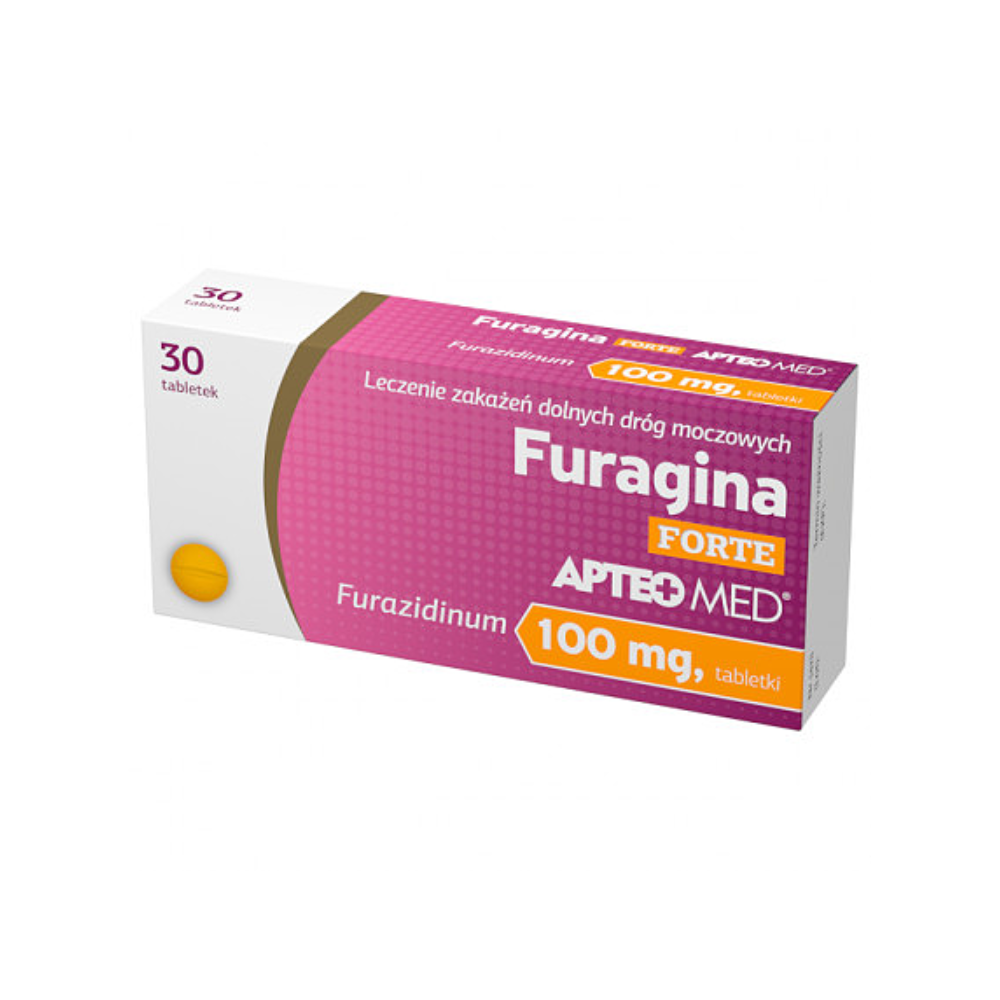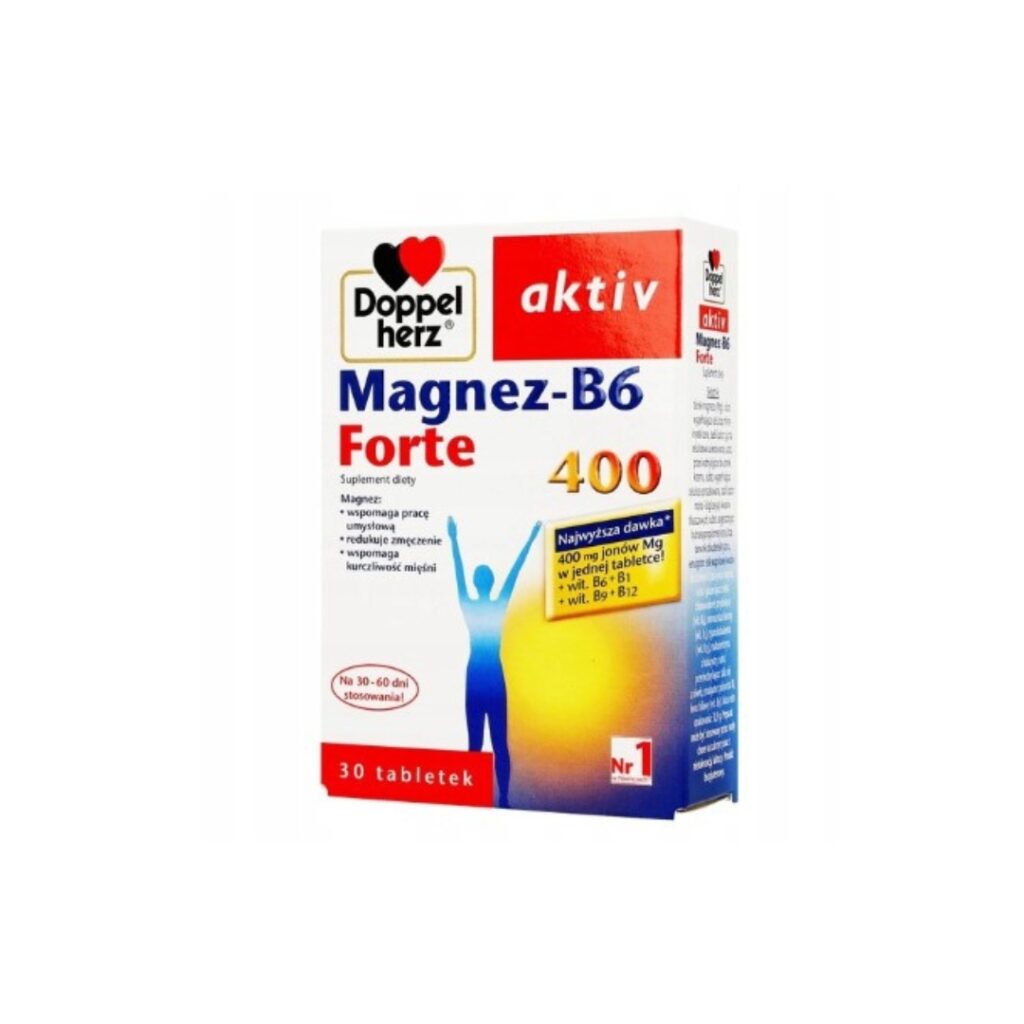Furagina Forte ApteoMed 100mg
Furagina Forte is a drug in the form of tablets for oral administration. It contains the active ingredient furazidine, also known as furagin, which is a derivative of nitrofuran. Furazidine inhibits the growth of many bacteria that cause urinary tract infections.
Symptoms
Infection of the lower urinary tract.
Active substance: Furazidinum
Composition
1 tablet of Furagina FORTE APTEO MED contains 100 mg of furazidine (Furazidinum), previously used name: furagin.
Excipient with known effect: lactose monohydrate 123 mg.
Dosage
- Adults and adolescents over 15 years of age: on the first day of use: 400 mg daily in 4 divided doses; on the following days: 300 mg daily in 3 divided doses. Treatment usually lasts 7-8 days.
- Children and adolescents under 15 years of age: Furagina FORTE APTEO MED should not be used in children and adolescents under 15 years of age.
Contraindications
- Hypersensitivity to the active substance, other nitrofuran derivatives or any of the excipients.
- During the first trimester of pregnancy.
- During term pregnancy (from 38 weeks) and delivery, due to the risk of haemolytic anemia in the newborn.
- In children and adolescents under 15 years of age.
- Renal failure (creatinine clearance below 60 ml / min or elevated serum creatinine).
- Diagnosed polyneuropathy, e.g. diabetic.
- Glucose-6-phosphate dehydrogenase deficiency.
Contents
The package of Furagina FORTE APTEO MED contains 30 tablets.
Storage method
15°C-25°C
Manufacturer
Warnings
Particular caution should be exercised in patients with renal and hepatic dysfunction, neurological disorders, anemia, electrolyte disturbances, vitamin B deficiency and folic acid, and lung diseases. Furazidine may cause the development of polyneuropathy, especially in diabetics. Peripheral polyneuropathy, which in severe cases may be irreversible and may be life-threatening, has been observed in patients treated with nitrofuran derivatives. Therefore, at the first symptoms of neuropathy (paraesthesia), Furagina FORTE APTEO MED should be discontinued. Acute, subacute and chronic pulmonary reactions have been reported in patients treated with nitrofuran derivatives. If signs of such a reaction occur, the product should be discontinued immediately. Chronic pulmonary reactions (including pulmonary fibrosis and disseminated interstitial pneumonia) may occur especially in the elderly. Careful monitoring of patients on long-term treatment with furazidine is recommended.
Rarely, hepatic dysfunction, including cholestatic jaundice and chronic hepatitis, may occur. Jaundice usually occurs with short-term use of nitrofurans (up to two weeks). Chronic hepatitis (sometimes leading to liver necrosis – fatalities have been reported) occurs during long-term use of nitrofurans (usually over 6 months). In case of hepatic dysfunction, furazidine treatment should be stopped immediately. During long-term use of the product, blood counts (leukocytosis) and biochemical parameters of kidney and liver function should be monitored.
With the administration of nitrofuran derivatives, false-positive results in urine glucose measurements using Benedict’s and Fehling’s solutions were found. Urine glucose measurements performed by enzymatic methods were normal.
Furagina FORTE APTEO MED contains lactose monohydrate. This product should not be administered to patients with rare hereditary problems of galactose intolerance, the lactase deficiency or glucose-galactose malabsorption.
Alcohol consumption should be avoided during furazidine therapy.
Side effects
Among the side effects most likely related to the use of the drug observed during clinical trials, the most common were nausea (8%), headache (6%) and excessive gas (1.5%). The other symptoms listed below occurred in up to 1% of patients and are listed according to the systems affected.
- Blood and lymphatic system disorders
- Cyanosis due to methaemoglobinaemia. In people with glucose-6-phosphate dehydrogenase deficiency, the use of furazidine may lead to the development of megaloblastic or haemolytic anemia.
- Nervous system disorders
- Dizziness, somnolence, visual disturbances, peripheral neuropathy, also acute or irreversible (especially predisposed to its occurrence are: renal failure, anemia, diabetes, electrolyte disturbances, vitamin B deficiency).
- Respiratory, thoracic and mediastinal disorders:
- Acute, subacute and chronic hypersensitivity reactions to nitrofuran derivatives. Chronic reactions have occurred in patients taking furazidine for more than 6 months. Chronic pulmonary reactions (including pulmonary fibrosis and disseminated interstitial pneumonia) may occur especially in the elderly. Acute respiratory hypersensitivity reactions presented as fever, chills, cough, chest pain, dyspnoea, pleural effusion, lung radiograph changes and eosinophilia. They usually disappeared quickly or very quickly after drug discontinuation. In the case of chronic reactions, the severity of symptoms and their reversibility after drug discontinuation depends on the duration of treatment continuation after the first adverse symptoms appear. It is essential to recognize the side effect as soon as possible and stop the medication. Lung dysfunction may be irreversible.
- Disorders of the stomach and intestines
- Constipation, diarrhea, dyspeptic symptoms, abdominal pain, vomiting, inflammation of the salivary glands, pancreatitis, pseudomembranous enteritis.
- Skin and subcutaneous tissue disorders
- Alopecia, exfoliative dermatitis, erythema multiforme, Stevens-Johnson syndrome.
- General disorders and administration site conditions
- Fever, chills, malaise, infections with microorganisms resistant to nitrofuran derivatives, most often with Pseudomonas or fungi of the genus Candida.
- Immune system disorders
- Pruritus, urticaria, anaphylaxis, angioedema, rash.
- Hepatobiliary disorders
- Symptoms of drug-induced hepatitis, cholestatic jaundice, liver parenchyma necrosis.




